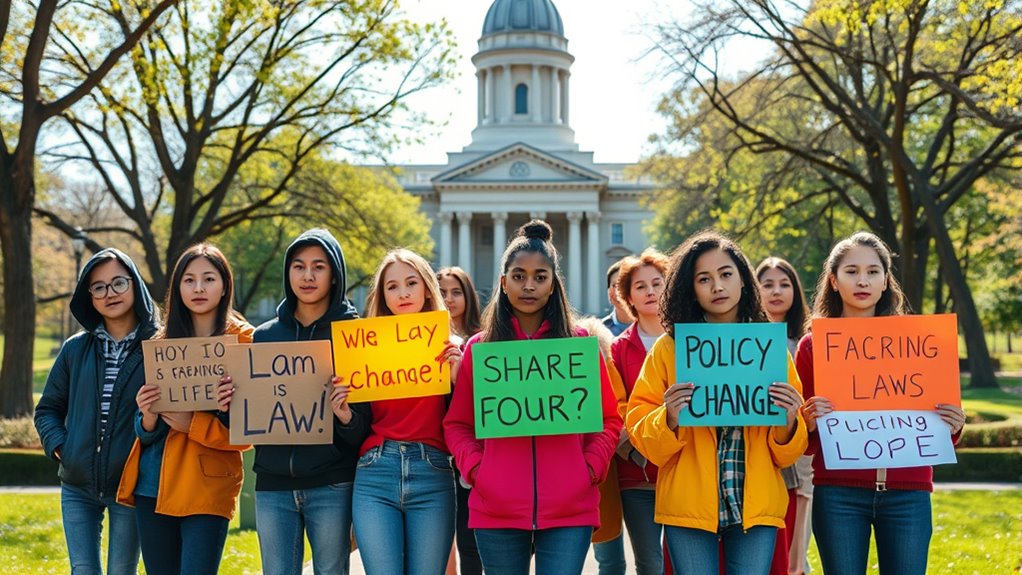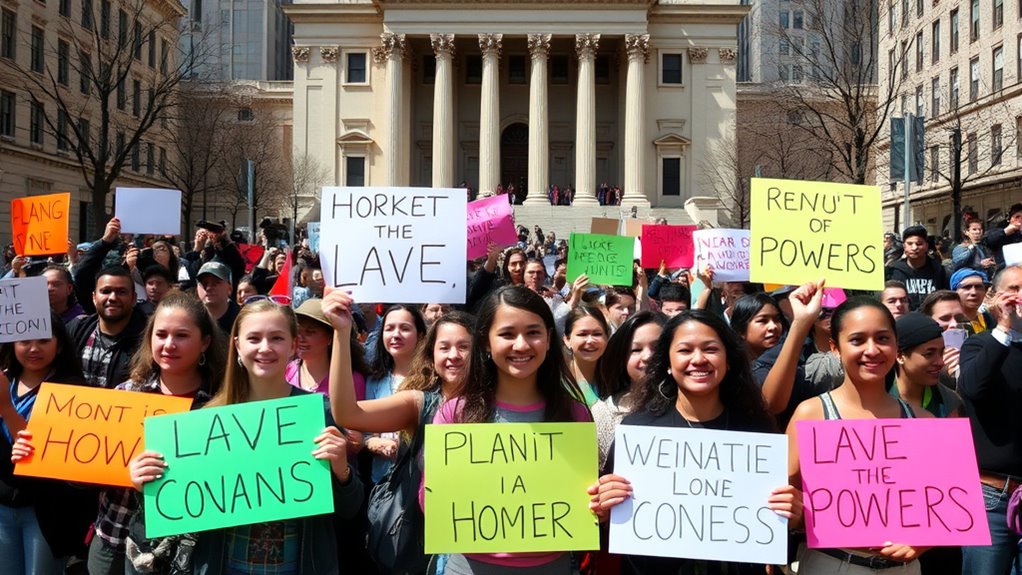Your voice as a young activist can directly influence laws through protests, campaigns, and engaging with policymakers. By organizing social media movements, petitions, and direct dialogues, you help shape policies on issues like climate change and education. Your collective efforts show that youth voices are powerful lawmakers today, not just tomorrow. Keep exploring how your actions can create real change, and you’ll discover ways to make an even bigger impact.
Key Takeaways
- Youth activism mobilizes protests, social campaigns, and direct engagement to influence policymakers and shape legislation.
- Young advocates push for policies on climate, education, and social justice through viral campaigns and grassroots efforts.
- Data literacy and technical knowledge empower youth to promote evidence-based policies and resource allocation.
- Youth-led organizations and social media campaigns raise awareness, rally support, and pressure lawmakers for legislative change.
- Collective youth efforts demonstrate their current impact, making their voices essential in creating inclusive, future-ready laws.

Youth activism has become a powerful force for driving policy change, demonstrating that young people are more than just future leaders—they are current changemakers. Your generation is stepping up, making your voices heard on critical issues like climate advocacy and educational reform. By organizing protests, leveraging social media, and engaging directly with policymakers, you’re shaping laws that affect your present and future. Climate advocacy, in particular, has seen remarkable youth involvement. You rally for sustainable policies, push governments to meet climate targets, and hold leaders accountable for environmental impacts. Your campaigns often go viral, inspiring global movements that pressure lawmakers into action. Through marches, petitions, and direct dialogues, you’re transforming the narrative around climate change from apathy to urgency. This collective effort demonstrates that your voice can influence legislation, leading to concrete commitments to reduce carbon emissions and invest in renewable energy. Additionally, understanding solar panel installation and maintenance can empower youth to advocate for clean energy policies and sustainable infrastructure in their communities. Recognizing the importance of predictive modeling can help young activists better understand how data influences policy decisions and resource allocation. Engaging with environmental data analysis further strengthens your ability to push for evidence-based policies. Similarly, your role in educational reform is equally impactful. You advocate for equitable, inclusive, and modernized education systems that meet the needs of diverse student populations. Whether it’s pushing for increased funding, better mental health resources, or curriculum changes that reflect your realities, you’re actively participating in shaping policies that define your learning environment. Youth-led organizations and student councils often collaborate with educators and policymakers to draft proposals and lobby for reforms. Your social media campaigns raise awareness about disparities in education, rally support for policy changes, and hold officials accountable for delivering on promises. When students speak out about issues like school safety, standardized testing, or access to technology, they often catalyze legislative discussions and reforms. Your activism makes it clear that educational policies should prioritize your well-being, engagement, and future readiness. Recognizing the importance of policy advocacy enables young people to better understand how their collective efforts can lead to tangible legislative outcomes.
Frequently Asked Questions
How Do Youth Activists Build Effective Coalitions?
You build effective coalitions by engaging your community actively and fostering genuine connections. Focus on community engagement to understand different perspectives and find common goals. Develop your leadership skills to inspire others and coordinate efforts. Reach out to diverse groups, listen to their concerns, and promote shared interests. By strengthening these relationships, your coalition becomes more powerful and better equipped to influence change, creating a united front for your cause.
What Funding Sources Support Youth-Led Policy Initiatives?
Think of funding as a mighty river fueling your activism. You can access grant opportunities that serve as the tributaries, offering direct support for your initiatives. Foundation support acts as the sturdy banks, guiding and sustaining your efforts. By steering through these resources, you gain the power to turn your ideas into impactful policies, ensuring your voice shapes laws that matter. Stay proactive and seek out these essential funding sources to keep your movement flowing strong.
How Do Young Activists Navigate Political Opposition?
You navigate political opposition by bridging generational gaps and increasing political engagement. You focus on building alliances, using social media to amplify your message, and staying informed about policy debates. By engaging with allies across age groups and fostering open dialogue, you can counter resistance. Your persistence and strategic communication help you influence decision-makers and guarantee your voice contributes to meaningful change, despite opposition.
What Role Do Social Media Algorithms Play in Youth Mobilization?
Did you know that social media algorithms influence 70% of online content you see? They play a pivotal role in youth mobilization by amplifying viral campaigns and creating online echo chambers. These algorithms prioritize sensational content, making it easier for young activists to spread their messages quickly. However, they can also limit exposure to diverse viewpoints, shaping how youth engage with social issues and inspiring collective action.
How Do Youth Voices Influence Local Versus National Policies?
You influence policies through your youth leadership and civic engagement by raising awareness and mobilizing others. At the local level, your voice can directly impact community decisions, while on a national scale, your involvement helps shape broader laws. Your active participation encourages policymakers to prioritize youth concerns, fostering change. By staying informed and engaged, you guarantee your perspectives are heard, whether shaping local initiatives or influencing national policy debates.
Conclusion
Your voice matters more than you think. When you speak up and get involved, you’re not just making noise—you’re shaping policies and changing laws. Youth activism proves that young people can be powerful catalysts for progress. Don’t wait for change to happen; be the spark that ignites it. Remember, even a small pebble can create ripples across a pond. Keep pushing, because your efforts can move mountains.









